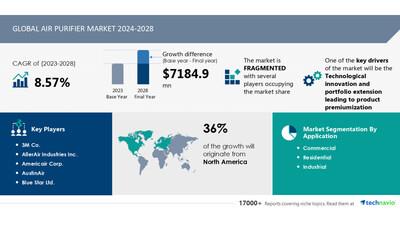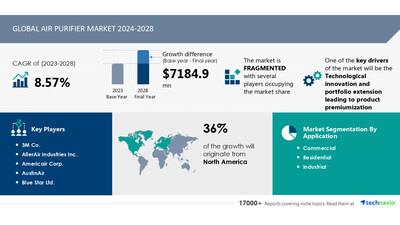
The Air Purifier Market Is Projected To Grow By USD 7.18 Billion From 2024-2028, Driven By Technological Innovation And Portfolio Expansion Leading To Product Premiumization, Including AI Impact--Technavio Report
| Air Purifier Market Scope |
|
| Report Coverage |
Details |
| Base year |
2023 |
| Historic period |
2018 - 2022 |
| Forecast period |
2024-2028 |
| Growth momentum & CAGR |
Accelerate at a CAGR of 8.57% |
| Market growth 2024-2028 |
USD 7184.9 million |
| Market structure |
Fragmented |
| YoY growth 2022-2023 (%) |
7.32 |
| Regional analysis |
APAC, North America, Europe, South America, and Middle East and Africa |
| Performing market contribution |
North America at 36% |
| Key countries |
US, China, Japan, Germany, and Canada |
| Key companies profiled |
3M Co., AllerAir Industries |
Market Driver
The air purifier market is witnessing significant growth due to increasing demand for advanced and innovative air purifying solutions. Vendors are capitalizing on this trend by introducing smart air purifiers, which offer user-friendly features, energy savings, and enhanced safety. These appliances come with Energy Star certification for energy efficiency, hassle-free maintenance, alert systems, and remote control functionality. Smart air purifiers, such as Honeywell's Air Touch X3 Office Air Purifier, are
Wi-Fi enabled and allow users to control the device and monitor air quality remotely. With features like adjustable backlight and easy-to-use controls, these appliances offer a convenient and effective solution for maintaining clean and healthy indoor air. The market for smart air purifiers is expected to grow steadily during the forecast period, as more consumers seek out these advanced and convenient solutions for improving indoor air quality.
The air purifier market is experiencing significant growth due to increasing health awareness and rising pollution levels in metropolises. Pleated filters, effective against harmful pollutants and airborne germs including viruses and bacteria, are trending. Healthcare facilities and life sciences applications prioritize air filtration protection. Nirvana, Levoit, and Blueair lead the residential market with their robust designs and noise-efficient models. Commercial use sees Blueair's Blue Pure Max as a top choice. Nylon core filters offer high virus removal capacity. Noise, product safety, and smart home technologies are key considerations. Airborne diseases, pollution levels, and the Clean Air Act drive demand. Workplaces seek substitutes for traditional air filters with HEPA filters using submicron glass fibers capturing particles as small as 0.3 microns. Outdoor air pollution and developing regions are new markets.
Explore a 360° Analysis of the Market: Unveil the Impact of AI. For complete insights- Request Sample!
Market Challenges
-
The air purifier market is experiencing significant growth and increasing demand, attracting both legitimate and counterfeit product manufacturers. Counterfeit air purifiers, made with low-quality materials and less durability, pose a challenge to market vendors. E-commerce platforms facilitate the distribution and sales of these counterfeit products, making it difficult for customers to distinguish them from genuine ones. Counterfeit products' relatively low price is a major factor contributing to their demand, negatively impacting vendors' sales and pricing strategies. To retain customers and protect brand reputation, vendors invest in advertising and promotional campaigns, which can be costly and reduce profit margins. The availability of counterfeit products also affects volume sales, potentially leading to inventory backlogs for international vendors. Counterfeit manufacturers save on production and transportation costs by operating in regional or local markets, making their products less expensive than genuine ones. Established global vendors aim to penetrate developing markets, such as India and China, where counterfeit products are prevalent. The presence of counterfeit products is expected to limit the growth of the global air purifier market during the forecast period. Vendors must focus on educating consumers about the risks and consequences of purchasing counterfeit products while maintaining competitive pricing and product quality.
The Air Purifier Market faces challenges in ensuring performance efficacy against various pollutants like smoke, dust, bio-contaminants, pollen, and urban pollutants. Environmental impact is a concern due to the use of activated carbon and charcoal filters, which may release gases and odors. Ionic filters, UV LED, and ionizers raise questions regarding their ability to effectively address all types of pollutants, including airborne viruses. Industrial activities, air pollution, and vehicular emissions contribute significantly to urban air pollution, necessitating air purification solutions. Asthma, allergies, and airborne infections are common health concerns linked to indoor air quality. Differentiating air purifiers based on unique features such as smart technology, coverage area, and air quality sensors is crucial. Misconceptions surrounding air purifiers as luxury items hinder market growth. Mechanical air filters, extended-surface filters, and filters for specific pollutants like mold spores, animal dander, dust mite, and cockroach allergens are essential offerings.
For more insights on driver and challenges
-
Request a
sample report!
Segment Overview
This air purifier market report extensively covers market segmentation by
Application-
1.1 Commercial
1.2 Residential
1.3 Industrial
-
2.1 HEPA
2.2 Electrostatic precipitators
2.3 Ionizers and ozone generators
2.4 Others
-
3.1 APAC
3.2 North America
3.3 Europe
3.4 South America
3.5 Middle East and Africa
1.1 Commercial-
The commercial segment dominates the global air purifier market, accounting for the largest share in 2023. Air purifiers are extensively used in various commercial spaces, including schools, malls, offices, hospitals, hotels, theaters, and other establishments. These purifiers, particularly those with activated carbon and HEPA filters, effectively eliminate harmful particles, smoke, and odors, enhancing indoor air quality. In healthcare facilities, air purifiers play a crucial role by eradicating odor-carrying pathogens and allergens, ensuring a clean and healthy environment for staff and patients. The increasing urbanization in developing countries, such as India, fuels the demand for air purifiers. The benefits of air purifiers, such as improved air quality and healthier indoor environments, are driving their adoption in commercial spaces, thereby propelling the growth of the global air purifier market.
For more information on market segmentation with geographical analysis including forecast (2024-2028) and historic data (2017-2021) - Download a Sample Report
Research Analysis
The Air Purifier market has witnessed significant growth due to rising concerns over airborne diseases, increasing pollution levels, and growing health awareness. With the standard of living improving in developing regions, the demand for air purification solutions has surged. Outdoor air pollution, caused by industrial activities, vehicular emissions, and urban air pollution, poses a major health risk. Air purifiers have become essential in mitigating the effects of air pollution, especially in areas with high levels of particles, such as submicron glass fibers, mold spores, animal dander, dust mite, cockroach allergens, and
respirable particles. Mechanical air filters, including HEPA filters and pleated filters, effectively trap these pollutants, providing relief from asthma, allergies, airborne infections, and other health issues caused by viruses and bacteria.
Market Research Overview
The air purifier market is witnessing significant growth due to rising concerns over airborne diseases, increasing pollution levels, and growing health awareness. With the standard of living improving in developing regions, there is a heightened focus on indoor air quality.
HEPA filters, submicron glass fibers, and other advanced technologies are being used to remove particles, smoke, dust, bio-contaminants, pollen, and gases from the air. Outdoor air pollution, industrial activities, vehicular emissions, and urban air pollution are major contributors to poor air quality. Air filters, including mechanical filters, activated carbon, charcoal, ionizers, UV LED, and HEPA filters, are popular air purification solutions. Smart home technologies, such as air quality sensors and smart air purifiers, are gaining popularity for their performance efficacy and product safety. However, there are misconceptions about the environmental impact of air purifiers and the availability of product substitutes. It is essential to consider the unique features of each air purifier, such as coverage area, noise level, and performance efficacy, when making a purchase. Airborne diseases, including asthma, allergies, and airborne infections, are a significant concern, especially in healthcare facilities and life sciences applications. Air purifiers offer air filtration protection against harmful pollutants, airborne germs, and other urban pollutants. Air purifiers are no longer considered luxury items but are becoming essential for both residential and commercial use. Companies are differentiating themselves by offering unique features, such as extended-surface filters, pleated filters, and virus removal capacity. Brands like Nirvana, Levoit, and Blueair are leading the market with their robust designs and innovative technologies. The Clean Air Act and pollution campaigns have led to stricter regulations on emissions, making it crucial for air purifier manufacturers to prioritize product safety and environmental impact. With the increasing focus on indoor air quality, the air purifier market is expected to continue its growth trajectory.
Table of Contents:
1 Executive Summary
2 Market Landscape
3 Market Sizing
4 Historic Market Size
5 Five Forces Analysis
6 Market Segmentation
-
Application
-
Commercial
Residential
Industrial
-
HEPA
Electrostatic Precipitators
Ionizers And Ozone Generators
Others
-
APAC
North America
Europe
South America
Middle East And Africa
7
Customer Landscape
8 Geographic Landscape
9 Drivers, Challenges, and Trends
10 Company Landscape
11 Company Analysis
12 Appendix
About
Technavio
Technavio is a leading global technology research and advisory company. Their research and analysis focuses on emerging market trends and provides actionable insights to help businesses identify market opportunities and develop effective strategies to optimize their market positions.
With over 500 specialized analysts, Technavio's report library consists of more than 17,000 reports and counting, covering 800 technologies, spanning across 50 countries. Their client base consists of enterprises of all sizes, including more than 100 Fortune 500 companies. This growing client base relies on Technavio's comprehensive coverage, extensive research, and actionable market insights to identify opportunities in existing and potential markets and assess their competitive positions within changing market scenarios.
Contacts
Technavio Research
Jesse Maida
Media & Marketing Executive
US: +1 844 364 1100
UK: +44 203 893 3200
Email:
[email protected]
Website:
SOURCE Technavio

Legal Disclaimer:
MENAFN provides the
information “as is” without warranty of any kind. We do not accept
any responsibility or liability for the accuracy, content, images,
videos, licenses, completeness, legality, or reliability of the information
contained in this article. If you have any complaints or copyright
issues related to this article, kindly contact the provider above.


















Comments
No comment